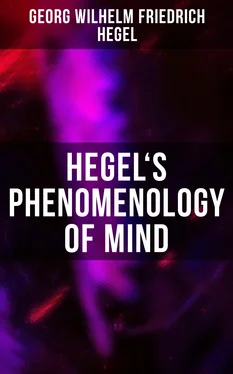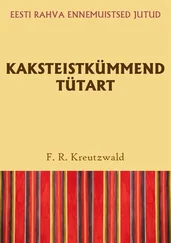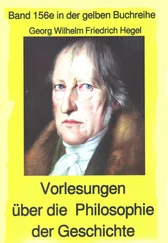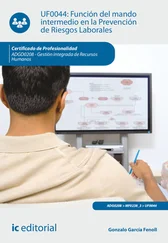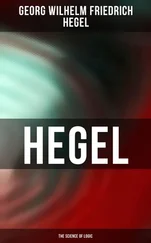We see that in the inner being of the sphere of appearance, understanding gets to know in truth nothing else but appearance itself, not, however, appearance in the shape of a play of forces, but that play of forces in its absolutely universal moments and in the process of those moments; in fact, understanding merely experiences itself. Raised above perception, consciousness reveals itself united and bound up with the supersensible world through the mediating agency of the realm of appearance, through which it gazes into this background that lies behind appearance. The two extremes, the one that of the pure inner region, the other that of the inner being gazing into this pure inner region, are now merged together; and as they have disappeared qua extremes, the middle term, the mediating agency, qua something other than these extremes, has also vanished. This curtain [of appearance], therefore, hanging before the inner world is withdrawn, and we have here the inner being [the ego] gazing into the inner realm — the vision of the undistinguished selfsame reality, which repels itself from itself, affirms itself as a divided and distinguished inner reality, but as one for which at the same time the two factors have immediately no distinction; what we have here is Self-consciousness. It is manifest that behind the so-called curtain, which is to hide the inner world, there is nothing to be seen unless we ourselves go behind there, as much in order that we may thereby see, as that there may be something behind there which can be seen. But it is clear at the same time that we cannot without more ado go straightway behind there. For this knowledge of what is the truth of the idea of the realm of appearance and of its inner being, is itself only a result arrived at after a long and devious process,, in the course of which the modes of consciousness, “meaning”, “perception”, and “understanding” disappear. And it will be equally evident that to get acquainted with what consciousness knows when it is knowing itself, requires us to fetch a still wider compass, What follows will set this forth at length.
6.Cp. Wissenschaft der Logik , Buch 2, Absch. 2, Kap. 3.
7.Cp. Goethe, ” Im innern der Natur “, etc.
8.Cp. Helmholtz, “It is precisely in the purest form of the expression of force — viz. In mechanical force which acts on a mass-point-that we find most clearly brought out that a force is merely the objectified law of action."- Lectures and Addresses , v., Eng., trans., Vol. I., p. 326.
9.The primitive procedure of individual vengeance finds its inner meaning revealed in the ethically justifiable procedure of punishment. But ethical punishment is really self-punishment (cp. Plato’s Gorgias ). Punishment, however, Hegel goes on to say, has an inner meaning of its own too.
Table of Contents
IV. The Truth which Conscious Certainty of Self Realizes
Table of Contents
[The analysis of experience up to this point has been occupied with the relation of consciousness to an object admittedly different in nature from the mind aware of it. This external opposition, however, breaks down under analysis, and we are left with the result that consciousness does and must find itself in unity with its object, a unity which implies identity of nature between consciousness and its object: consciousness becomes “certain of itself in its object”. This is not merely a result, but the truest expression of the initial relation with which experience starts. It is, therefore, the ground of the possibility of any relation between the terms in question: “consciousness of self” is the basis of the consciousness of anything whatsoever. This is Hegel’s re-interpretation of the Kantian analysis of experience.
But this result is, again, really the starting-point for a further analysis of experience, but of experience at a higher level of realization. Consciousness of self is to begin with a general attitude, a definite type of experience, which requires elucidation. It has its own conditions and forms of manifestation. Self-consciousness, being supreme, must realize itself in relation to nature, to other selves similar to the self, and to the Ultimate Being of the world. These are different kinds of content with which consciousness is to find its oneness, and they furnish different forms in which the same principle is manifested. The argument seeks to show that these forms are also different degrees of realization of self-consciousness. The outcome of the argument is that self-consciousness is truly realized only when it is universal self-consciousness, when consciousness is certain of itself throughout all reality, and explicitly finds there only itself. This result takes the form, as we shall see, of what is called Reason .
The immediately succeeding section takes up the first stage of the development of self-consciousness — the consciousness of self in relation to nature. This takes the shape of Desire, Instinct, Impulse, etc., and involves the category of Life. This relationship, while undoubtedly implying the sense of self in the object and consciousness of unity with it, is the least satisfying and the least complete of all the modes of self-consciousness. It points the way, therefore, to the fuller sense of self obtained when the self is aware of itself in relation to another self.]
In the kinds of certainty hitherto considered, the truth for consciousness is something other than consciousness itself. The conception, however, of this truth vanishes in the course of our experience of it. What the object immediately was in itself — whether mere being in sense-certainty, a concrete thing in perception, or force in the case of understanding — it turns out, in truth, not to be this really; but instead, this inherent nature ( Ansich ) proves to be a way in which it is for an other. The abstract conception of the object gives way before the actual concrete object, or the first immediate idea is cancelled in the course of experience. Mere certainty vanished in favour of the truth. There has now arisen, however, what was not established in the case of these previous relationships, viz. a certainty which is on a par with its truth, for the certainty is to itself its own object, and consciousness is to itself the truth. Otherness, no doubt, is also found there; consciousness, that is, makes a distinction; but what is distinguished is of such a kind that consciousness, at the same time, holds there is no distinction made. If we call the movement of knowledge conception, and knowledge, qua simple unity or Ego, the object, we see that not only for us [tracing the process], but likewise for knowledge itself, the object corresponds to the conception; or, if we put it in the other form and call conception what the object is in itself, while applying the term object to what the object is qua object or for an other , it is clear that being “in-itself” and being “for an other” are here the same. For the inherent being ( Ansich ) is consciousness; yet it is still just as much that for which an other (viz. what is “in-itself”) is. And it is for consciousness that the inherent nature ( Ansich ) of the object, and its “being for an other” are one and the same. Ego is the content of the relation, and itself the process of relating. It is Ego itself which is opposed to an other and, at the same time, reaches out beyond this other, which other is all the same taken to be only itself.
With self-consciousness, then, we have now passed into the native land of truth, into that kingdom where it is at home. We have to see how the form or attitude of self-consciousness in the first instance appears. When we consider this new form and type of knowledge, the knowledge of self, in its relation to that which preceded, namely, the knowledge of an other, we find, indeed, that this latter has vanished, but that its moments have, at the same time, been preserved; and the loss consists in this, that those moments are here present as they are implicitly, as they are in themselves. The being which “meaning” dealt with, particularity and the universality of perception opposed to it, as also the empty, inner region of understanding-these are no longer present as substantial elements ( Wesen ), but as moments of self-consciousness, i.e. as abstractions or differences, which are, at the same time, of no account for consciousness itself, or are not differences at all, and are purely vanishing entities ( Wesen ).
Читать дальше
